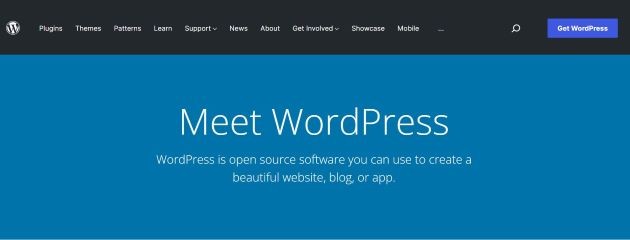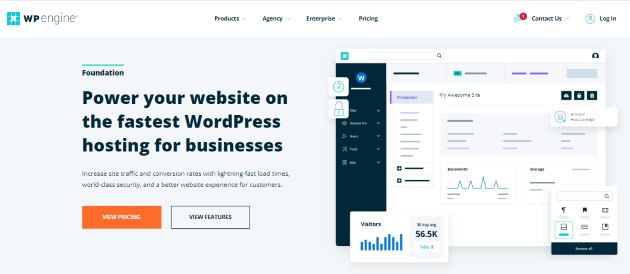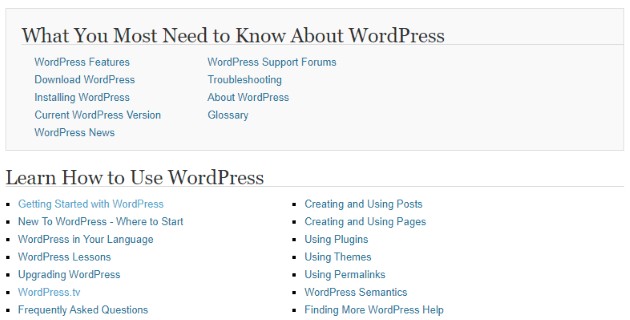Is mastering WordPress a challenging endeavor? Absolutely not. At LEARNS.EDU.VN, we believe learning WordPress can be an engaging and rewarding experience, particularly for those eager to establish an online presence or enhance their digital skills. This guide delves into the realities of learning WordPress, offering insights and resources to smooth your journey. Discover the platform’s user-friendliness and versatility, making website development accessible to everyone, fostering digital literacy and empowerment.
1. Understanding the Learning Curve of WordPress
WordPress, the world’s leading Content Management System (CMS), powers a significant portion of the internet. But how difficult is WordPress to learn? The answer hinges on several factors, including your technical background, your goals for using WordPress, and the resources you leverage.
1.1. The Basics are Accessible
For individuals looking to create a simple blog or website, the basic functionalities of WordPress are remarkably accessible. The intuitive dashboard, drag-and-drop functionality of many themes and plugins, and a wealth of online tutorials make it possible to get a site up and running quickly.
1.2. Diving Deeper Requires Dedication
However, mastering WordPress, especially for complex websites with advanced features, demands a more significant time investment. Understanding HTML, CSS, and PHP can be beneficial for customization beyond the basics, and learning how to optimize your site for SEO and performance is an ongoing process.
1.3. Factors Influencing the Learning Curve
- Technical Skills: Prior experience with web development or coding can accelerate the learning process.
- Learning Style: Some individuals prefer structured courses, while others thrive through hands-on experimentation.
- Time Commitment: Consistent effort and practice are key to mastering any new skill, including WordPress.
- Specific Goals: The complexity of your website vision will directly impact the depth of knowledge required.
2. Demystifying WordPress Terminology
Navigating the world of WordPress involves understanding some key terminology. Familiarizing yourself with these terms will significantly ease your learning journey.
2.1. Essential WordPress Jargon
| Term | Definition |
|---|---|
| CMS | Content Management System; software for creating and managing digital content. |
| Theme | A collection of files that determine the design and layout of your website. |
| Plugin | An add-on that extends the functionality of your website. |
| Dashboard | The administrative interface where you manage your website. |
| Post | A type of content typically used for blog entries, displayed in reverse chronological order. |
| Page | A static type of content used for information like “About Us” or “Contact” pages. |
| Widget | Small blocks of content that can be placed in various areas of your website, like sidebars or footers. |
| Gutenberg | The block-based editor introduced in WordPress 5.0, allowing for more flexible content creation. |
| SEO | Search Engine Optimization; techniques to improve your website’s visibility in search engine results. |
| Responsive Design | Ensuring your website adapts seamlessly to different screen sizes and devices. |
| Custom Post Type | Allows you to create unique content types beyond the standard posts and pages. |
| Taxonomy | A way to categorize and organize your content, such as categories and tags. |
| Child Theme | A theme that inherits the functionality and styling of another theme, known as the parent theme, allowing for safe customization. |
| Permalink | The permanent URL for a specific page or post on your website. |




2.2. Understanding the WordPress Ecosystem
WordPress is not just a CMS; it’s an ecosystem. A vast community of developers, designers, and users contribute to its growth, creating themes, plugins, and resources that empower users worldwide. This collaborative environment fosters innovation and provides ample support for learners.
3. Dispelling Common Myths About Learning WordPress
Several misconceptions can deter individuals from exploring WordPress. Let’s debunk some common myths and reveal the truth about learning this powerful CMS.
3.1. Myth: You Need to be a Coding Expert
Reality: While coding knowledge can be advantageous, it’s not a prerequisite for using WordPress. Numerous themes and plugins offer customization options without requiring any coding. For more advanced modifications, basic HTML and CSS knowledge can be helpful, but there are plenty of resources to learn these skills.
3.2. Myth: WordPress is Only for Blogs
Reality: WordPress is a versatile platform that can power various types of websites, including business websites, e-commerce stores, portfolios, and online magazines. Its flexibility and extensive plugin library make it suitable for diverse applications.
3.3. Myth: WordPress is Difficult to Manage
Reality: WordPress has a user-friendly interface that simplifies website management. The dashboard provides easy access to essential functions, and the plugin system allows you to extend functionality without complex coding. With a little practice, managing a WordPress website becomes intuitive and straightforward.
3.4. Myth: All WordPress Themes Look the Same
Reality: WordPress offers a vast selection of themes, ranging from free to premium, each with its unique design and features. You can customize themes to match your brand and create a distinctive online presence. The ability to use page builders and custom CSS further enhances design flexibility.
4. Proven Strategies for Mastering WordPress
Learning WordPress effectively requires a strategic approach. Here are some proven strategies to accelerate your learning and become proficient in using WordPress.
4.1. Start with the Fundamentals
Begin by understanding the core concepts of WordPress, such as themes, plugins, posts, and pages. Explore the dashboard and familiarize yourself with the various settings and options. Focus on building a solid foundation before diving into more advanced topics.
4.2. Hands-On Practice is Essential
The best way to learn WordPress is by doing. Create a test website and experiment with different themes, plugins, and settings. Try building different types of pages and posts, and practice customizing the design and functionality of your site.
4.3. Leverage Online Resources
The internet is brimming with WordPress tutorials, courses, and documentation. Take advantage of these resources to learn new skills and troubleshoot issues. LEARNS.EDU.VN offers a wealth of articles and guides to support your learning journey.
4.4. Join the WordPress Community
Engage with the WordPress community through forums, social media groups, and local meetups. Connecting with other users can provide valuable insights, support, and inspiration. Sharing your experiences and asking questions can accelerate your learning and help you overcome challenges.
4.5. Stay Updated with the Latest Trends
WordPress is constantly evolving, with new features, themes, and plugins being released regularly. Stay informed about the latest trends and updates to ensure you’re using the most effective techniques and tools. Subscribe to WordPress blogs and newsletters, and follow industry experts on social media.
5. Essential Tools and Resources for WordPress Learners
Numerous tools and resources can aid your WordPress learning journey. Here’s a curated list of essential resources to help you master the platform.
5.1. Online Courses and Tutorials
| Platform | Description |
|---|---|
| LEARNS.EDU.VN | Comprehensive articles and guides covering various aspects of WordPress, from basic setup to advanced customization. |
| WPBeginner | A popular website offering WordPress tutorials, tips, and resources for beginners. |
| Lynda.com (LinkedIn Learning) | Provides a wide range of WordPress courses taught by industry experts, covering topics from basic setup to advanced development. |
| Udemy | Offers a vast selection of WordPress courses for all skill levels, with options to filter by price, rating, and duration. |
| WP101 | A video subscription service focused exclusively on learning WordPress, with carefully scripted content for beginners. |
| Team Treehouse | Provides comprehensive WordPress courses with a focus on coding and web development, suitable for those looking to build custom themes and plugins. |
| Coursera | Offers WordPress courses and specializations from top universities and institutions, providing a structured learning experience. |
| Skillshare | Features a variety of WordPress classes taught by experienced professionals, covering topics such as theme customization, plugin development, and SEO. |
| Envato Tuts+ | Offers a wide range of WordPress tutorials and courses, including video tutorials, written guides, and project-based learning. |
| Codecademy | Provides interactive coding lessons for HTML, CSS, and PHP, which can be beneficial for customizing WordPress themes and plugins. |
5.2. WordPress Documentation and Support
- WordPress Codex: The official online manual for WordPress, offering extensive documentation and resources.
- WordPress.org Forums: A community forum where you can ask questions, share knowledge, and get support from other WordPress users.
- WordPress TV: A collection of video tutorials and presentations on various WordPress topics.
5.3. Essential Plugins for Learning and Development
| Plugin Name | Functionality |
|---|---|
| Yoast SEO | Helps you optimize your website for search engines, providing guidance on keyword usage, readability, and technical SEO. |
| Akismet Anti-Spam | Protects your website from spam comments and trackbacks, ensuring a clean and professional online presence. |
| Contact Form 7 | Enables you to create custom contact forms for your website, allowing visitors to easily get in touch with you. |
| WooCommerce | Transforms your WordPress website into a fully functional e-commerce store, allowing you to sell products and services online. |
| Elementor | A drag-and-drop page builder that allows you to create custom layouts and designs without coding, providing a visual and intuitive website building experience. |
| W3 Total Cache | Improves your website’s performance by implementing various caching techniques, reducing page load times and enhancing user experience. |
| Jetpack | A comprehensive plugin that offers a wide range of features, including security enhancements, performance optimization, and marketing tools. |
| UpdraftPlus | Automates website backups to cloud storage services like Google Drive and Dropbox, ensuring that your website data is safe and secure. |
| Wordfence Security | Protects your website from malware, hacking attempts, and other security threats, providing a robust security solution. |
| All in One SEO Pack | A comprehensive SEO plugin that helps you optimize your website for search engines, providing guidance on keyword usage, readability, and technical SEO. |
6. Maximizing Your WordPress Learning Experience
To gain the most from your WordPress learning journey, consider these practical tips and strategies.
6.1. Define Clear Goals
Start by defining what you want to achieve with WordPress. Are you building a blog, a business website, or an e-commerce store? Having clear goals will help you focus your learning efforts and prioritize the skills you need to acquire.
6.2. Break Down Complex Tasks
WordPress can seem overwhelming at first, but breaking down complex tasks into smaller, manageable steps can make the learning process more approachable. Focus on mastering one skill or concept at a time, and gradually build your knowledge base.
6.3. Embrace Experimentation
Don’t be afraid to experiment with different themes, plugins, and settings. WordPress is a flexible platform, and there are often multiple ways to achieve the same result. Experimenting will help you discover what works best for you and develop your own unique style.
6.4. Seek Feedback and Collaboration
Share your work with others and ask for feedback. Constructive criticism can help you identify areas for improvement and refine your skills. Collaborate with other WordPress users on projects to learn from their experiences and expand your network.
6.5. Celebrate Your Progress
Acknowledge and celebrate your achievements along the way. Learning WordPress is a journey, and it’s important to recognize your progress and stay motivated. Reward yourself for completing milestones, and take pride in the websites you create.
7. Common Challenges and How to Overcome Them
Even with the right resources and strategies, you may encounter challenges while learning WordPress. Here are some common obstacles and tips on how to overcome them:
7.1. Information Overload
Challenge: The abundance of information available on WordPress can be overwhelming, making it difficult to know where to start or what to focus on.
Solution: Start with the fundamentals and prioritize essential skills. Focus on building a solid foundation before diving into more advanced topics. LEARNS.EDU.VN offers curated content that guides you through the most important concepts.
7.2. Technical Issues
Challenge: Encountering technical issues, such as plugin conflicts or theme errors, can be frustrating and time-consuming.
Solution: Troubleshoot systematically by disabling plugins one by one to identify the source of the problem. Consult WordPress forums and documentation for solutions. Consider seeking assistance from a WordPress developer if the issue persists.
7.3. Design Dilemmas
Challenge: Creating a visually appealing and user-friendly website can be challenging, especially without design experience.
Solution: Start with a well-designed theme and customize it to match your brand. Use a page builder plugin to create custom layouts without coding. Seek inspiration from other websites and design resources.
7.4. Security Concerns
Challenge: Ensuring the security of your WordPress website is crucial to protect it from hacking attempts and malware.
Solution: Install a security plugin and keep your WordPress core, themes, and plugins updated. Use strong passwords and enable two-factor authentication. Regularly backup your website to prevent data loss.
8. Case Studies: Real-World WordPress Success Stories
Inspiration can be a powerful motivator. Here are a couple of brief case studies showcasing how individuals and organizations have successfully leveraged WordPress.
8.1. Small Business Empowerment
A local bakery owner with no prior web development experience used WordPress to create an online store, showcasing their products and accepting online orders. The user-friendly interface and e-commerce plugins made it possible to expand their business reach and increase sales.
8.2. Non-Profit Organization Outreach
A non-profit organization utilized WordPress to build a website that effectively communicated their mission, shared success stories, and facilitated online donations. The platform’s flexibility and blogging capabilities enabled them to engage with their audience and raise awareness for their cause.
9. The Future of WordPress and its Learning Landscape
WordPress continues to evolve, driven by community contributions and technological advancements. Here are some trends shaping the future of WordPress and its learning landscape:
9.1. Block-Based Editing (Gutenberg)
The Gutenberg editor has revolutionized content creation in WordPress, offering a more visual and intuitive experience. Learning how to effectively use Gutenberg is essential for modern WordPress development.
9.2. Headless WordPress
Headless WordPress is gaining popularity, allowing developers to use WordPress as a content repository while building the front-end with other technologies like React or Vue.js. This approach offers greater flexibility and performance.
9.3. Low-Code/No-Code Solutions
The rise of low-code/no-code platforms is making it easier for non-technical users to build complex WordPress websites without coding. Page builders and visual development tools are empowering individuals to create stunning websites with ease.
9.4. AI-Powered Tools
Artificial intelligence is increasingly being integrated into WordPress, offering features like automated content creation, SEO optimization, and website security. Learning how to leverage AI tools can enhance your WordPress workflow and improve website performance.
| Trend | Description |
|---|---|
| Gutenberg Editor | The block-based editor introduced in WordPress 5.0, offering a more visual and intuitive content creation experience. |
| Headless WordPress | Using WordPress as a content repository while building the front-end with other technologies like React or Vue.js, offering greater flexibility and performance. |
| Low-Code/No-Code Solutions | Platforms and tools that allow non-technical users to build complex WordPress websites without coding, empowering individuals to create stunning websites with ease. |
| AI-Powered Tools | Integration of artificial intelligence into WordPress, offering features like automated content creation, SEO optimization, and website security to enhance workflow and improve website performance. |
| Enhanced Security Features | Continuous improvements in WordPress security to protect websites from evolving threats, including malware scanning, intrusion detection, and vulnerability patching. |
| Mobile-First Design | Emphasizing the importance of creating websites that are optimized for mobile devices, ensuring a seamless user experience across all screen sizes and devices. |
| Improved Accessibility | Making WordPress websites more accessible to people with disabilities, following accessibility guidelines and implementing features like alternative text for images and keyboard navigation. |
| E-commerce Integration | Streamlining the process of creating and managing online stores with WordPress, integrating with popular e-commerce platforms and providing tools for product management, payment processing, and shipping. |
| Community-Driven Development | The active and collaborative WordPress community contributes to the platform’s growth and improvement through theme and plugin development, bug fixes, and support forums, fostering innovation and knowledge sharing. |
10. Taking the Next Step with LEARNS.EDU.VN
Ready to embark on your WordPress learning journey? LEARNS.EDU.VN is your trusted partner, providing the resources, guidance, and support you need to succeed.
10.1. Explore Our Comprehensive Resources
Visit our website at LEARNS.EDU.VN to access a wealth of articles, tutorials, and guides covering various aspects of WordPress. Whether you’re a beginner or an experienced user, you’ll find valuable information to enhance your skills and knowledge.
10.2. Connect with Our Community
Join our online community to connect with other WordPress learners, share your experiences, and ask questions. Our forums and social media groups provide a supportive environment where you can learn from others and get the help you need.
10.3. Contact Us for Personalized Support
If you need personalized support or have specific questions, don’t hesitate to contact us. Our team of WordPress experts is here to help you overcome challenges and achieve your goals.
Contact Information:
- Address: 123 Education Way, Learnville, CA 90210, United States
- WhatsApp: +1 555-555-1212
- Website: LEARNS.EDU.VN
Learning WordPress is an achievable goal with the right resources and approach. At LEARNS.EDU.VN, we’re committed to empowering you with the knowledge and skills you need to create stunning websites and achieve your online aspirations. Embrace the journey, stay curious, and never stop learning.
Frequently Asked Questions (FAQ)
Q1: How long does it take to learn WordPress?
The time it takes to learn WordPress varies depending on your goals and learning style. You can learn the basics in a week or two, but mastering advanced features may take several months.
Q2: Do I need to know coding to use WordPress?
No, coding knowledge is not required to use WordPress. However, basic HTML and CSS knowledge can be helpful for customization.
Q3: Is WordPress free to use?
Yes, WordPress.org is a free and open-source platform. However, you’ll need to pay for hosting and a domain name.
Q4: Can I use WordPress for e-commerce?
Yes, you can use WordPress for e-commerce by installing the WooCommerce plugin.
Q5: How do I choose a WordPress theme?
Consider your website’s purpose, design preferences, and desired features when choosing a theme. Explore the WordPress theme repository or premium theme marketplaces.
Q6: What are WordPress plugins?
WordPress plugins are add-ons that extend the functionality of your website. They can be used for various purposes, such as SEO, security, and e-commerce.
Q7: How do I update WordPress?
You can update WordPress through the dashboard by navigating to Dashboard > Updates.
Q8: How do I backup my WordPress website?
You can backup your WordPress website using a plugin like UpdraftPlus or by manually backing up your files and database.
Q9: How do I improve my WordPress website’s SEO?
Use a plugin like Yoast SEO and follow SEO best practices, such as optimizing your content for keywords and building backlinks.
Q10: Where can I get help with WordPress?
You can get help with WordPress through the WordPress Codex, WordPress forums, and online tutorials. learns.edu.vn also offers comprehensive resources and support.
